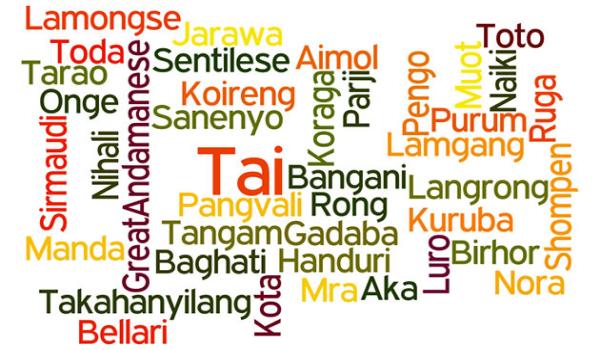On loss of languages
It depends on ALL OF US, not on the Internet.
Consider these facts, and comments:
- Of the over 6,000 languages still spoken (in 2020), almost 3,000 of these are classified as endangered on the EGIDS scale.
- This has happened and is happening, all over the world, often with support from not just the cultural supremacist right, but self-declared left utilitarian developmentalists as well.
- It takes remarkably little to destroy a language. If you can halt transmission to younger generations of a population, it will simply disappear as its speakers grow old and eventually pass away.
- Active policies of linguicide can do this… simply taking away the ability to transmit the language.
The extinction is everywhere

<u><em><strong>CAPTION:</strong>
<a href="https://mediaindia.eu/culture/curious-case-of-linguicide/" target="_blank">Source: Procaffenation, from Curious case of linguicide, February 2020</a>
</em></u>
Language extinction is especially frequent around indigenous communities in developing countries, and their cases are the most urgent. But language extinction happens everywhere. To make just one example, from World Wide Web greatly accelerates the phenomenon:
- When it comes to technology support, there are massive differences between Europe’s languages and technology areas
- Support for English is ahead of any other language
- But: even support for English is far from being perfect.
- “At Least 21 European Languages in Danger of Digital Extinction!” (in 2012…)
And the Internet makes things much worse, of course
The quotes in the initial paragraph come from “A Quiet Death: The Acceptable Loss of Language”.
Digital Language Extinction has been a a problem since the invention of computers, and the World Wide Web greatly accelerates the phenomenon. Today, “Only digitally thriving languages can take care of themselves!”
The bright, complicated side
This matter is complicated, and it really affects every language, except what? English, Mandarin, Spanish and a handful, maybe a dozen others?
I remember being shocked, also offended, during a vacation in California in the 90s. I was with a relative of mine, who had been living there for one year with her family, including a son that was about one year old then. While strolling in a park, she talked to her baby, in Italian obviously. When we walked by another woman, she scolded my relative for that!
Because, she said, my relative was doing the baby no good by keeping him fully bilingual, rather than just turning him, even inside his own family of first generation immigrants, in a full-time, monolingual speaker that would then not risk discriminations, feeling awkward and so on.
Outrageous, really. And really stupid too.
Then again: my own kids speak and write English much better than me at their age, and they achieved this much more quickly, and much more cheaper, almost for free, than me. They started watching videogame streaming and tutorials on YouTube, and engaging in many discussions on the related, obviously English-only forums, then moved on to read, write and study “serious” stuff. Thanks to those spontaneous, almost unconscious efforts, they now have an edge over their peers who snobbed the same activities, and now can’t do more than asking for a McBurger.
And this happened only thanks to the Internet. The same Internet that, while destroying (by carelessness, mainly) several language every year, we have to thank if, today,
- “You can have a language spoken by only 50 or 500 people, only in one location, and now through digital technology that language can achieve a global voice."
- “Many speakers are using technology to do really interesting things that were not imaginable a generation back"
And a permanently preserved, too. It only depends on us, and on the respect and care that (at least) everybody who can read this text should have for every other language. As usual, the real problem is not technological, “just” social and human.
Final, OBVIOUS request: Translations of this post, or any other post on this website for that matter, in any language are always very welcome! Just email me.
Who writes this, why, and how to help
I am Marco Fioretti, tech writer and aspiring polymath doing human-digital research and popularization.
I do it because YOUR civil rights and the quality of YOUR life depend every year more on how software is used AROUND you.
To this end, I have already shared more than a million words on this blog, without any paywall or user tracking, and am sharing the next million through a newsletter, also without any paywall.
The more direct support I get, the more I can continue to inform for free parents, teachers, decision makers, and everybody else who should know more stuff like this. You can support me with paid subscriptions to my newsletter, donations via PayPal (mfioretti@nexaima.net) or LiberaPay, or in any of the other ways listed here.THANKS for your support!